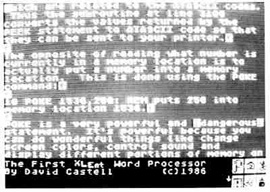
January 31, 2013

I guess I should explain about text editors. They are programs that create and manipulate text files, which are the simplest kinds of files. A text file’s contents are just typewriter keystrokes, one byte of storage per keystroke. A text file containing the text “Barack Obama” is 15 bytes in size: twelve for the symbols (including the space), one each for carriage return and line feed, and one to say “file ends here.” A Microsoft Word file containing that same text is hundreds of times bigger, packed with information about paragraph spacing, text color, font style, page orientation, kerning, and God only knows what else.
Text files are data at its most basic and manageable. A text editor handles text files for you. KEDIT is the best text editor I’ve ever used. (Though not the smallest. Back when PC Magazine used to include full assembler-language listings of handy programs, they gave us one called TED, for “Tiny Editor,” that did all the basic text manipulations while occupying only 2KB of memory. KEDIT is 500 times that; MS Word about 150,000 times.)
Trouble is, KEDIT has issued no major new releases since 1996. The company that produced it, Mansfield Software Group, has just one remaining employee, Kevin Kearney at the University of Connecticut Storrs campus. McPhee”the New Yorker guy, pay attention!”went to visit him there. He found him helpful and reassuringly healthy.
Thank goodness for that. If KEDIT support were to disappear altogether and the oafs at Microsoft were to upgrade Windows into some form that could not run KEDIT, I’d be sunk.
These are the tribulations of the late abandoner. There are plenty of us around. At about the time John McPhee was buying his first PC, Bill Buckley was taking up a word processor called WordStar. He remained loyal to WordStar to the end of his life, though support had long since been discontinued and Bill needed continuous technical help to keep the thing running on later-model computers.
We late abandoners are culture heroes, the grit in the accursed machine that is bringing process to triumph over result, form over content, the vehicle over the cargo. Sure, there are times writers should upgrade their skills, but those times ought to be a few centuries apart: clay blocks to papyrus, hand-copying to printing, goose quills to fountain pens. If we are to learn complex new data-entry skills every twenty years, when shall we have time to think?
Late abandoners. Spare a thought.